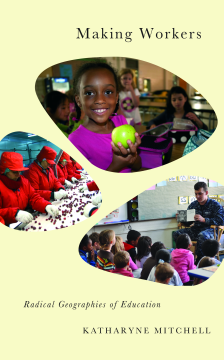
Additional Information
Book Details
Abstract
As globalisation transforms the organisation of society, so too is its impact felt in the classroom. Katharyne Mitchell argues that schools are spaces in which neoliberal practices are brought to bear on the lives of children. Education’s narratives, actors and institutions play a pivotal role in the social and political formation of youth as workers in a capitalist economy.
Mitchell looks at the formation of student identity and allegiance –as well as spaces of resistance. She investigates the transition to educational narratives emphasising flexibility and strategic global entrepreneurialism and examines the role of education in a broader political project of producing new generations of economically insecure but compliant workers.
Scrutinising the impact of an influx of new actors, practices and policies, Mitchell argues that public education is the latest institution to embrace the neoliberal logic of 'choice' – pertaining to schools, faculty, and curricula – that, if unchallenged, will lead to further incursions of the market and increased socioeconomic inequality.
'A beautifully written and highly engaging account of neoliberalism and it’s still unfolding capture of our public educational institutions, teachers and students... This book should be at the top of the reading list for all who wish to understand the impacts of the last forty years of transformation in education as well as those who wish to join the struggle to save our schools and our children'
Sallie A. Marston, Professor, School of Geography and Development and Director, Community and School Garden Program, University of Arizona
'Katharyne Mitchell's Making Workers is an exemplary analysis of the structural forces, networks, discourses, and practices shaping educational systems from compulsory education through to higher education, including life-long learning. Given the importance of education systems to the production of citizens as well as the work-force, Mitchell’s book is a must-read for all interested in the future of economy and society'
Kris Olds, Professor, Department of Geography, University of Wisconsin-Madison
Table of Contents
| Section Title | Page | Action | Price |
|---|---|---|---|
| Cover | Cover | ||
| Contents | v | ||
| Acknowledgements | vi | ||
| Abbreviations | ix | ||
| Series Preface | x | ||
| Part I: Geographies of Work and Education | 1 | ||
| 1. Spatial Divisions of Labor and the Search for Jobs | 3 | ||
| 2. Creating the Entrepreneurial Child | 25 | ||
| Part II: Flexible Work, Strategic Workers | 43 | ||
| 3. From Multicultural Citizen to Global Businessman | 45 | ||
| 4. Geographies of Lifelong Learning and the Knowledge Economy | 67 | ||
| 5. Global Restructuring and Challenges to Citizenship | 83 | ||
| Part III: The Reform Coalition | 97 | ||
| 6. Market Philanthropy in Education | 99 | ||
| 7. The Choice Machine and the Road to Privatization | 119 | ||
| Part IV: Geographies of Resistance, Acts of Citizenship | 137 | ||
| 8. Taking Back Our Schools and Cities | 139 | ||
| 9. Conclusion: Paying Deep Attention | 157 | ||
| Notes | 165 | ||
| Index | 182 |
